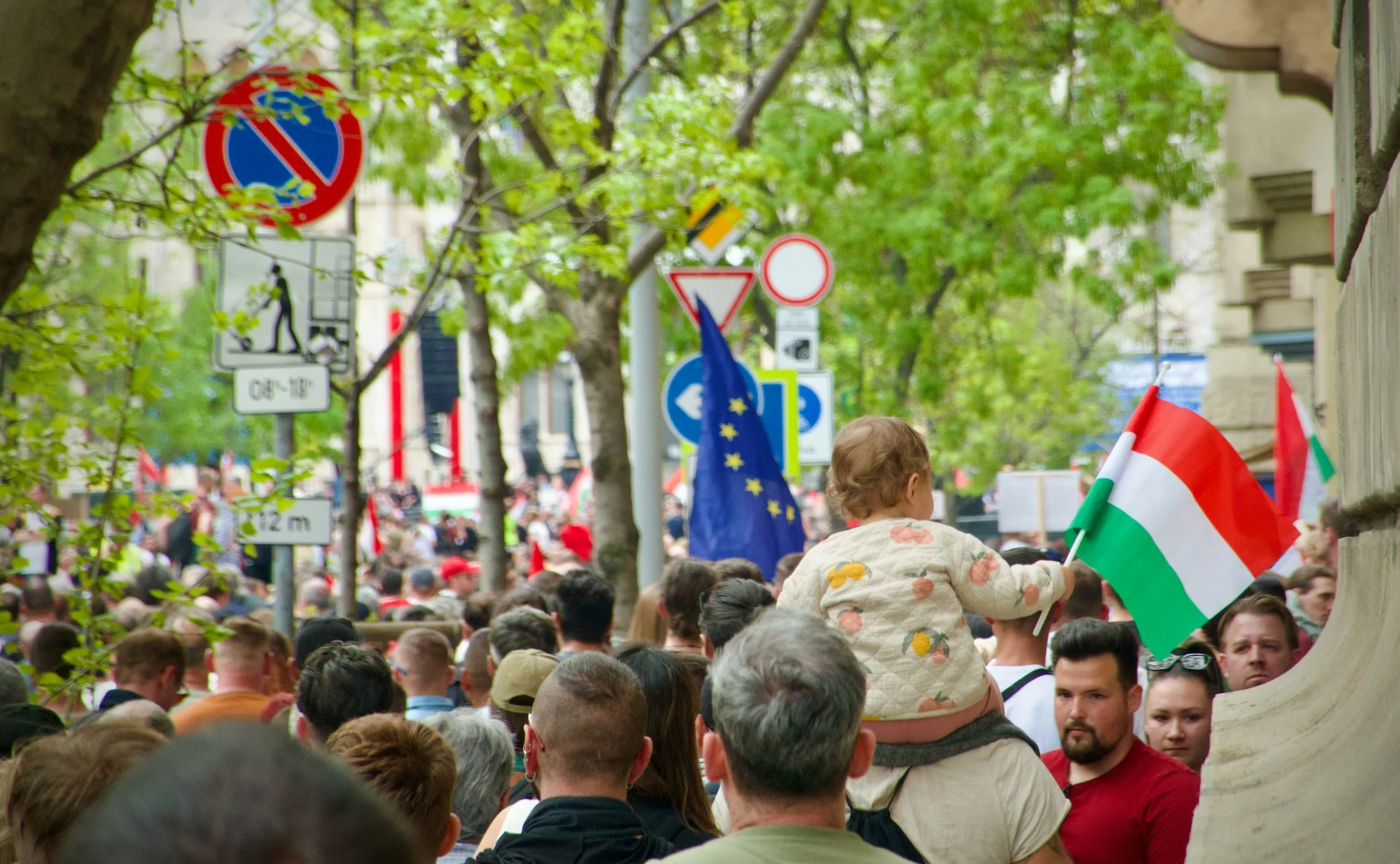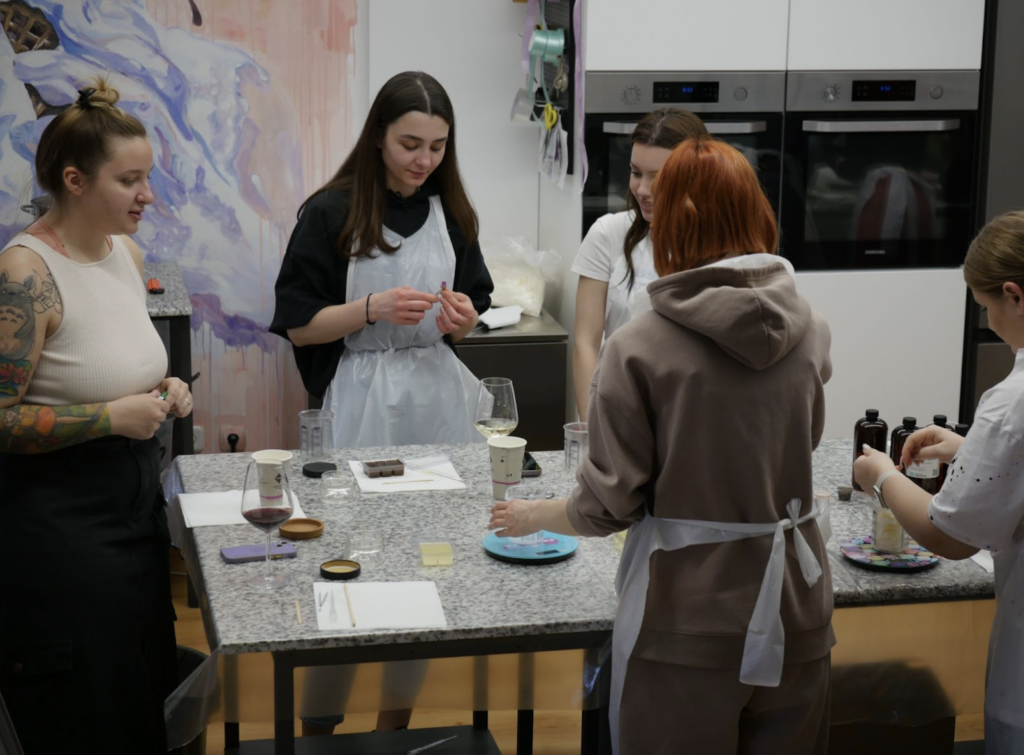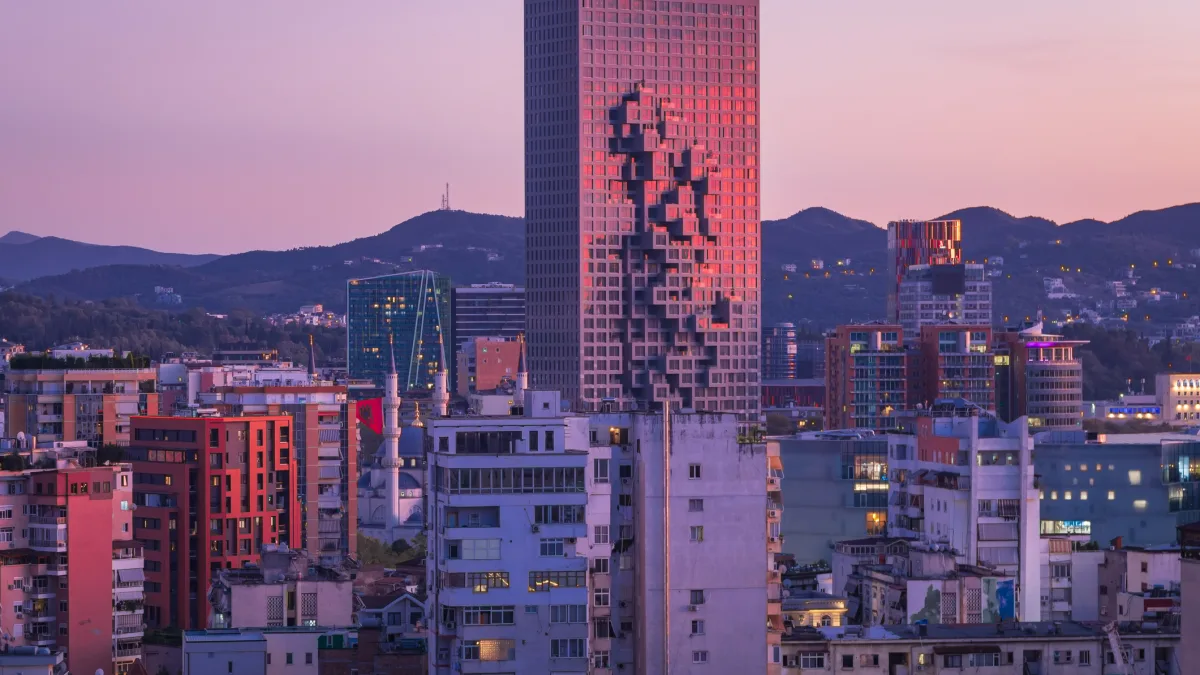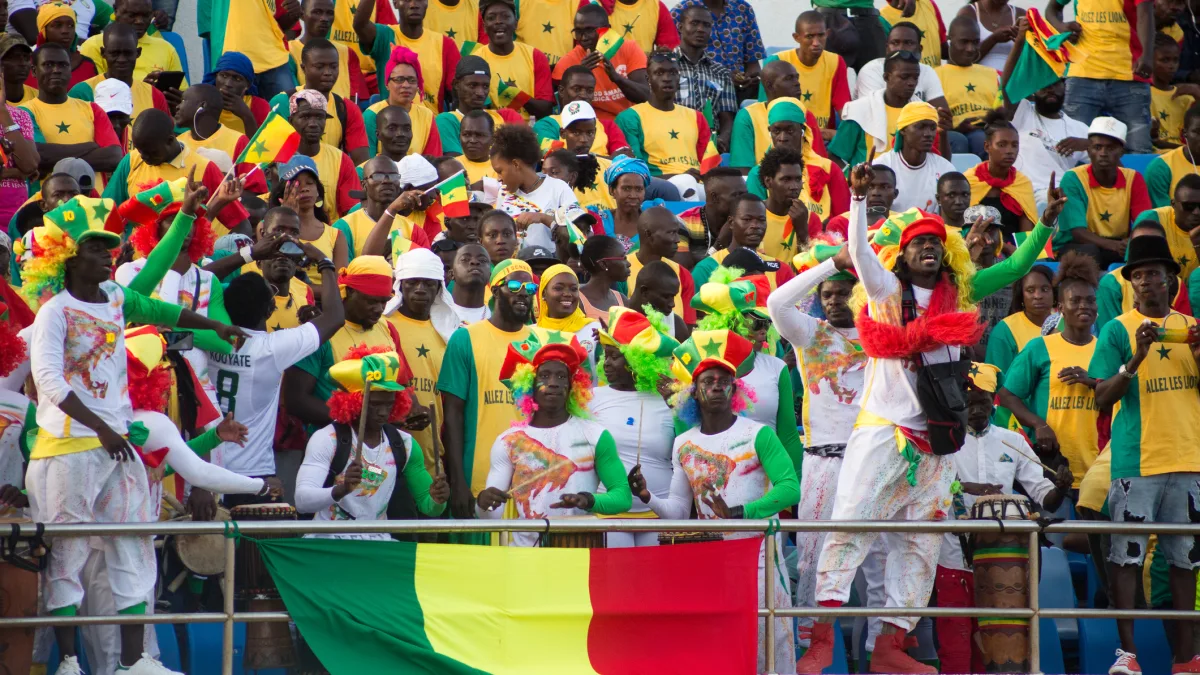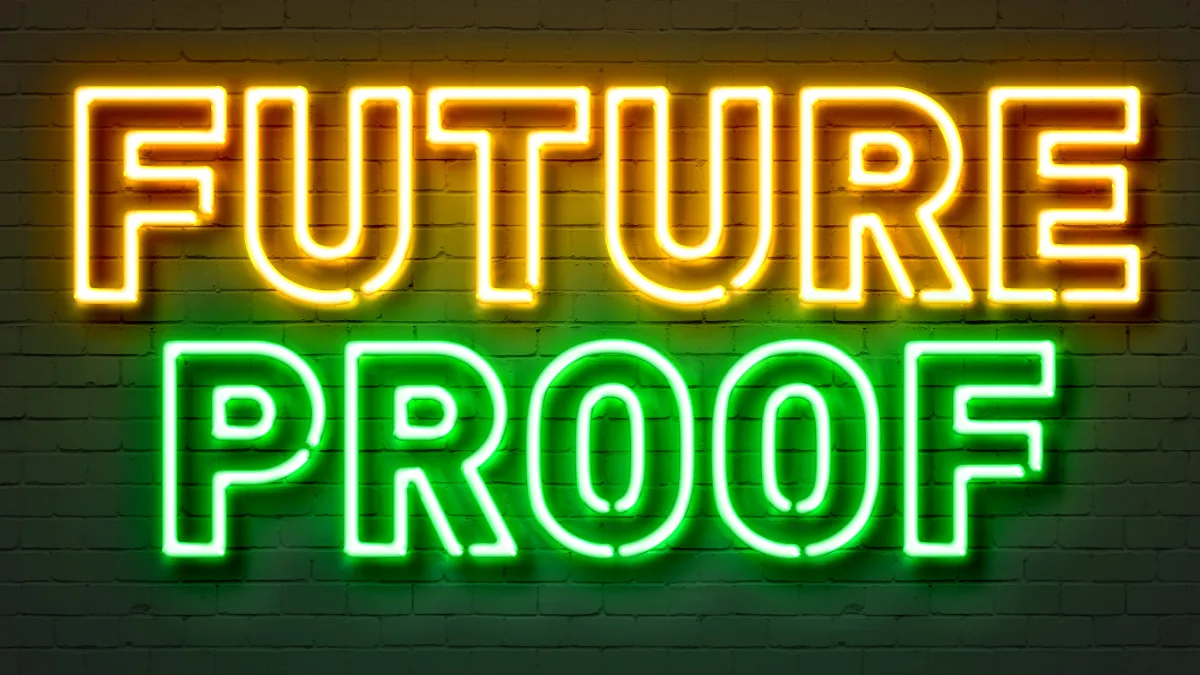Amid grey apartment buildings and speeding cars, there is a space in Ciocana, a suburb of Chişinău, the capital of Moldova, that stands out. It’s hidden behind a petrol station where men smoke cigarettes and unkempt dogs sniff the public waste bins.
Somewhere there, Anna Sîrbu opens the door and lets me into a bright room that smells of vanilla, flowers, and wine. Women chat with glasses in their hands. Suddenly, the engine-revving suburb disappears to the background.
The painted walls feature people made of ice cream in pastel tones.
A candle workshop is about to begin.
In her Moró Atelier, Anna organises events and workshops for an entrance fee to learn and bond over baking, painting, and handicrafts. She invites skilled women to guide the workshop participants through the learning process in her space.
“[The facilitators] are sometimes worried that people won’t show up at their events and that something will go wrong,” Anna explains when we sit on the second floor, looking down at the workshop. The participants murmur as they fill their containers with wax and perfumes.
“I tell them that the first time may be awful,” Anna continues. But it will improve if you don’t stop, and more people will learn about you.” It was her experience, too. In November 2022, only five people came to her very first baking class. Now, her space is full.
It’s hard to start a new company anywhere, but starting one as a woman in Moldova adds another layer to the challenge. Start-up culture is new here. The EU-funded Moldova’s gender profile analysis from 2021 highlighted that stereotypes about being “weaker” and less talented in business affect women in Moldova. It also concluded that women are less confident and optimistic when it comes to starting a business.
In Moldova, women are typically encouraged to find a stable income and focus on raising a family. Any big change can be perceived as risky. This is what Anna went through.
‘What more do you want?’
Anna had a well-paid job in a marketing agency. “Everyone believed I was living the dream,” she tells me. “What more could I possibly want from life?”.
But when the war in Ukraine erupted, she fell into depression. Her grandmother, aunt, and many other relatives live in Ukraine. It made it even more heartbreaking for Anna. “I realised how unpredictable life can be. That’s when I decided to leave my long-standing marketing job and start my own company.”
She was shocked to see that only her husband supported her decision. “I lost nearly all my friends. I thought they were my closest allies, but within a month, they distanced themselves from me.” She is unsure why. Someone hinted at her bravery to embark on something new. “I hope I haven’t offended anyone by doing that,” she adds. “I understood I should only take the advice of those who have walked a similar path and created the life I aspire to rather than those who remain stagnant. Why should I listen to the people whose lives I don’t want to live?” This idea was a game-changer for her.

Slowly, things are changing in Moldova.
Viorica Cerbusca is the head of Yep!Moldova, an incubation and acceleration programme that develops early-stage start-ups and promotes the entrepreneurship culture in Moldova.
She has seen a shift in thinking in recent years. “After the war, people started seeing things differently,” she said. Yep!Moldova organises events for starting entrepreneurs twice a year. About 70 per cent of the participants are women. “Women start to look more at what they like, what’s their passion. They don’t have that much shame anymore,” Viorica says.
She encourages female participants not to victimise themselves because of their gender. “We focus on business,” she says. She tells them: “I cannot change society, but I can support and show you what you can achieve.”
She admits that childcare and domestic duties are still mostly on women’s shoulders in Moldova, even when they have full-time jobs. Therefore, work time is limited. Viorica adds: “You have to accept that your rhythm will be slower, and that’s okay.”
An ecosystem is being created. Dreamups, another start-up support ecosystem founded in 2015, had an equal ratio of women and men in its programs in 2023. And the support is growing at the highest level. In October 2023, Prime Minister Dorin Recean opened a new three-year, 1.5-million euros programme dedicated to female founders. Women entrepreneurs can apply for financial support to start or develop a business. The programme also includes training, consulting, and mentoring. This is encouraging women in all ages.
‘The pandemic scared me’
Another hidden space in Ciocana, tucked between bumps, bathroom supplies, and car tires. Ana Bradu, the founder of Green Pack Moldova, is trying to bring more environmental thinking to Moldova in a small room with a green wall. There are kitchen compost boxes piled on the floor from Slovenia. She shows me plastic-free cups and paper bags on the table. As a small nation, Moldova cannot afford to produce everything independently. Ana is importing larger quantities so restaurants and private users can access fully biodegradable packaging products.
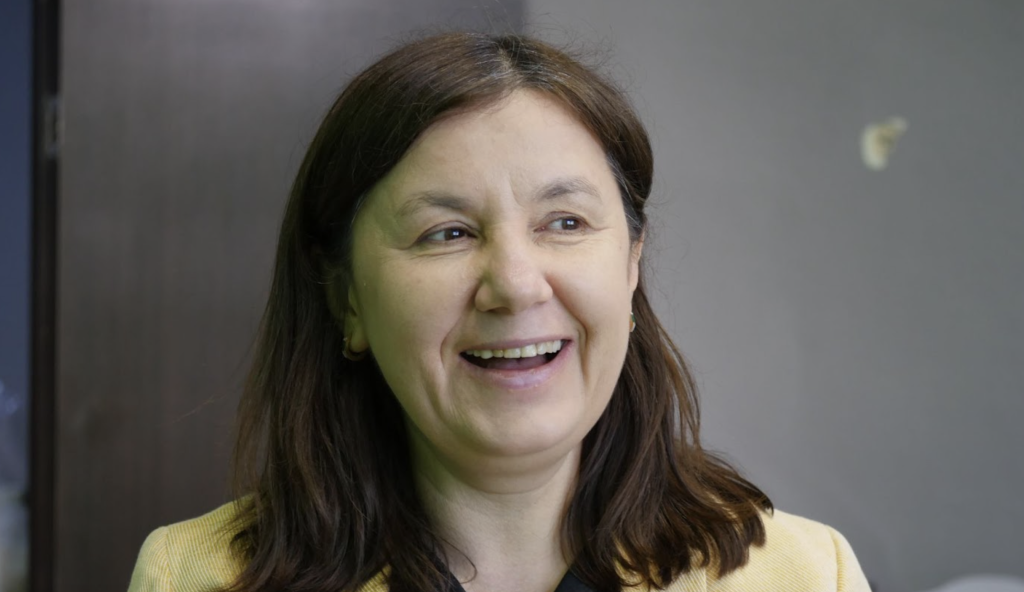
After 17 years as a journalist at a public broadcasting TV station, she shifted to entrepreneurship just a few years ago. “The pandemic scared me,” she admits. Her relatives went through tough times, and she wasn’t sure she would see them again.
“I’m not too young anymore. I understood that I wanted to keep active as long as possible. I wanted something that would push me forward and give me energy, something I would love.”
But the people around her were not encouraging. Very few support her. They would tell her she already had a stable salary and a comfortable life. Why ruin that?
She admits she risks losing everything, but that doesn’t hold her back. “You can lose honourably,” she says with a wide smile.
She made the switch to entrepreneurship slowly. At first, Ana worked in her free time. Then, she combined it with part-time work. Finally, she quit her job after two years of tipping her toes in the new field. “I understood that things won’t work out if I don’t give it my all and concentrate 100 per cent.”
Designing games
For graphic designer Maria Ginga, the biggest obstacle was finding a real problem her product solves. She created a game that teaches its players about environmental thinking. “Even if it’s indirectly, through my game, I’m afraid of telling people that they are doing something wrong,” she says. “But I think I will overcome this.”
Maria loves drawing characters. She wants to give them functionality and bring them to life. When she started with her boyfriend a year and a half ago, they only spent a little time and effort thinking about who it was for.

“I took part in an accelerator and understood that ideas can be developed into projects and financially supported,” she remembers.
“Usually, in Moldova, people create products because there is already a place ready to sell them. We don’t think about the customer or if they need the product,” she says. Experimenting has not been very encouraged, in her view.
So, the start-up culture is bringing a new way of thinking to Moldova, where it’s OK to fail and try things out—even if it’s terrifying at first.

